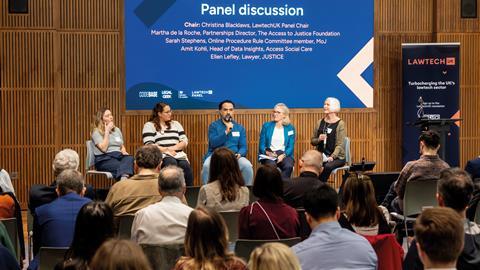LawtechUK’s latest laudable goal is to use artificial intelligence to help improve access to justice. But who is going to design – and pay for – this new ecosystem of online services?
Lord Justice Birss is a believer. ‘AI used properly... will democratise legal help for unrepresented people,’ the deputy head of civil justice said last month in a notably bullish speech entitled ‘Future visions of justice’. ‘One could imagine an early legal advice and assistance service designed to be the first port of call for individuals with limited means, with a front end using the natural language abilities of large language models,’ he told an audience at King’s College London.
Such a system would form an important component of the master of the rolls’ vision of a civil justice ‘funnel’ – an ecosystem of online services, public and private, filtering out the vast majority of civil disputes without the involvement of physical courts.
But where will these innovative AI-assisted solutions come from? The usual assumption, probably correct given the public sector’s record in such things, is that they will come from private-sector startups and third-sector bodies. This is the thinking behind a change of emphasis in the five-year-old LawtechUK programme, which last month kicked off an access to justice initiative. We even have a new buzzword, ‘justicetech’, to distinguish the work from previous technology-based efforts which focused on improving lawyer efficiency.
But putting together software packages costs money. And the launch event of LawtechUK’s access to justice programme, in London last month, was notably light on the business case for investment in justicetech startups.
A keynote speaker, Maya Markovich of US trade group the Justice Technology Association, identified a structural problem. The people who know most about the issue are those who have had ‘lived experience’ of barriers to justice, she said. But such people generally do not have the resources or expertise to create tech startups. ‘Those who are closest to the problem are closest to the solution – but are farthest from resources,’ she said.
'One could imagine an early legal advice and assistance service designed to be the first port of call for individuals with limited means, with a front end using the natural language abilities of large language models'
Lord Justice Birss
In the US there seems to be interest from ‘impact investors’ – investors with social goals – looking for technology to disrupt antiquated systems, Markovich noted. It is unclear whether anything similar is happening in the UK.
The event heard pitches from three promising startups: Wenup, a service for creating pre-nuptial agreements; Advisers Toolbox, which automates the writing of case notes; and MyGoodbyes, an app to encourage conversations about death (see page 12). It was notable that none of the presenters set out their business models – and perhaps most significant that no audience member sought to ask.
And, while Martha de la Roche, partnerships director at the Access to Justice Foundation, offered the possibility of financial support, technologist Amit Kohli, of advice charity Access Social Care, called for an ‘all-hands-on-deck movement’ along the lines of that seen during Covid. ‘If the funding becomes more available, the innovation will follow.’
Sarah Stephens of the University of Sussex said that the new Online Procedure Rule Committee, of which she is a member, is committed to ‘capturing users’ voices’ and building systems around the needs of users, not lawyers. But she noted that the committee is still awaiting the statutory instrument necessary for it to start work.
Meanwhile LawtechUK is doing its bit with a new programme to connect ‘key legal market players with the most forward-thinking startups’. Lawtech Bridge will get under way in June and is now inviting applications for participation. ‘We think big companies don’t know how to buy and small companies don’t know how to sell,’ Martin Boyle of incubator CodeBase said.
But is technology the only lifeboat for access to justice? It was the founder of one of the UK’s most notable justicetech startups, Danae Shell of employment law support platform Valla, who raised the possibility of a new government restoring access to justice by reversing legal aid cuts.
‘It’s a different world to 2012, and legal aid wasn’t perfect then,’ responded Ellen Lefley of Justice. Stephens agreed. ‘We simply cannot go back to what we had before. How the money is used and spent would look very different – and should look very different,’ she said.
And, speaking of end-of-life conversations, LawtechUK itself is in its terminal phase: its budget runs out next April. Calls from figures such as Professor Richard Susskind for a National Centre for Legal Innovation to succeed it appear so far to have fallen on deaf ears.
Justicetech could be orphaned just when it is most needed.
This article is now closed for comment.





































4 Readers' comments